| Srl | Item |
| 1 |
ID:
146966
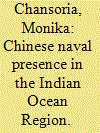

|
|
|
|
|
| Summary/Abstract |
The future trajectory of Sino-Indian relations shall be determined by the route that China undertakes to gain greater strategic primacy in India’s immediate neighbourhoodmost importantly in and around the Indian Ocean region. With PLA’s naval presence in the Indian Ocean now becoming an almost regular feature, it would only be far-sighted to assume that the growing need to operate far from home shores is the main driver for China’s new operational maritime missions. Establishing berthing rights and a possible forward presence are vital pivots for the constantly improving capabilities of the PLA-Navy. As China’s presence in the Indian Ocean becomes more established, it expectedly could challenge Indian interests in the Indian Ocean, thereby placing the existing Indian deterrence-at-sea under considerable strain.
|
|
|
|
|
|
|
|
|
|
|
|
|
|
|
|
| 2 |
ID:
146967
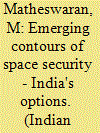

|
|
|
|
|
| Summary/Abstract |
Space has emerged as a critical centre of gravity. The use of space-derived inputs is a vital necessity for the conduct of everyday life on Earth. While civil and commercial space activities provide a range of applications, create employment, and promote technological progress, the use of space for military and intelligence purposes has become critical requirements for national security.
The fears of an arms race and power-politics for dominating space or establishing control and hegemony in space are very real. The emerging contours of space security are dominated by the contest between national security interests of states and the interests of the larger humanity. This contest is unlikely to ever end. In the meantime, India must preserve its freedom to access and exploit space for its security and development. Given rapid developments in technology and space capabilities, it is important that India steers itself into a position of strength in space, technologically, economically, and militarily, in order to support and usher 21st century space as a peaceful ‘Global Commons.”
|
|
|
|
|
|
|
|
|
|
|
|
|
|
|
|
| 3 |
ID:
146968


|
|
|
|
|
| Summary/Abstract |
n terms of regional dimensions, the North East Asian identity of Mongolia, together with socio-economic and political ties with other countries (particularly in Asia) generate much scope for further expansion and concretisation of India-Mongolian cooperation in various sectors. Herein, the political role of Buddhism takes precedence in guiding engagements with foreign partners and institutions. Therefore, Buddhism - both as a religion and as a soft power foreign policy tool - must be seen in the context of achieving the goals of peaceful co-existence, ensuring friendship from generation to generation, and furthering mutual development through cooperation in terms of foreign policy objectives. Buddhism in Mongolia’s foreign policy perspectives may prove to be beneficial not only in the smooth execution of relations with countries like India but also with Russia as well as other countries of East Asia, including both Southeast and Northeast Asia where Buddhist communities exist in large numbers.
The convergence of political, economic and social interests may get a definite push in Mongolia’s bilateral and multilateral relations if its Buddhist diplomacy succeeds, especially in the Asian context. In this vein, PM Modi’s Mongolia visit can be described as a “strategic step” in order to make India’s strong presence felt in East Asia in general, and Northeast Asia, including Mongolia, in particular.
|
|
|
|
|
|
|
|
|
|
|
|
|
|
|
|
| 4 |
ID:
146963
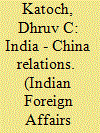

|
|
|
|
|
| Summary/Abstract |
India needs a measure of pragmatism in its policy of dealing with China. Increased trade flows do not by themselves lead to an absence of conflict. The excellent personal rapport developed between the Indian Prime Minister and his Chinese counterpart, while useful, is also not a guarantor of peace. That comes about through hard power. India will need to develop its economic and military might to safeguard its vital national interests. Militarily, it is vital that India maintain adequate deterrent capability in the oceans as well as over the Tibetan skies. That is the guarantor of peace.
|
|
|
|
|
|
|
|
|
|
|
|
|
|
|
|
| 5 |
ID:
146965
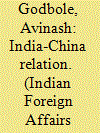

|
|
|
|
|
| Summary/Abstract |
Prioritisation of economic development and the immense scope of engagement-led development in the last decade have led to somewhat more mature India-China relations. Pragmatic leadership and an increase in people to people contact in areas of education, trade, and tourism will only create a momentum leading to deeper understanding. India and China have aimed to expand predictability in their bilateral relationship by enhancing the scope of engagement that promises a better future for both the countries.
|
|
|
|
|
|
|
|
|
|
|
|
|
|
|
|
| 6 |
ID:
146964
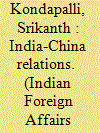

|
|
|
|
|
| Summary/Abstract |
To prevent the emergence of any conflict situation, both China and India need to usher in an intensive dialogue mechanism across the board, with each other’s core sensitive issues discussed and solutions implemented. Compliance on this issue is a matter of power equations; however, in a similar asymmetrical power equation, India needs to understand that China did extract concessions from the United States previously.
|
|
|
|
|
|
|
|
|
|
|
|
|
|
|
|
| 7 |
ID:
146969
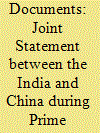

|
|
|